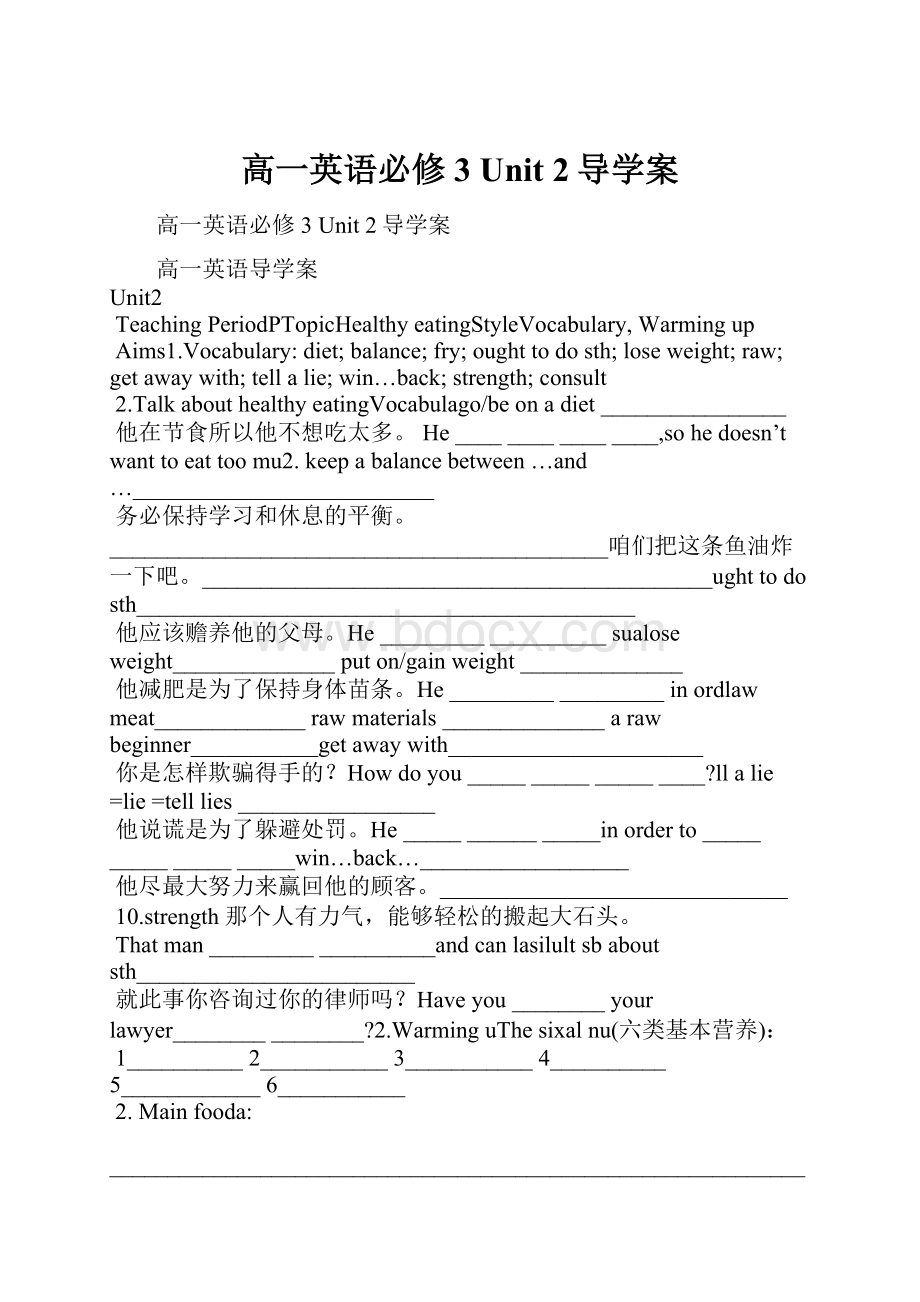高一英语必修3 Unit 2导学案.docx
《高一英语必修3 Unit 2导学案.docx》由会员分享,可在线阅读,更多相关《高一英语必修3 Unit 2导学案.docx(13页珍藏版)》请在冰豆网上搜索。

高一英语必修3Unit2导学案
高一英语必修3Unit2导学案
高一英语导学案
Unit2
TeachingPeriodPTopicHealthyeatingStyleVocabulary,Warmingup
Aims1.Vocabulary:
diet;balance;fry;oughttodosth;loseweight;raw;getawaywith;tellalie;win…back;strength;consult
2.TalkabouthealthyeatingVocabulago/beonadiet________________
他在节食所以他不想吃太多。
He________________,sohedoesn’twanttoeattoomu2.keepabalancebetween…and…__________________________
务必保持学习和休息的平衡。
___________________________________________咱们把这条鱼油炸一下吧。
____________________________________________ughttodosth___________________________________________
他应该赡养他的父母。
He___________________sualoseweight______________puton/gainweight______________
他减肥是为了保持身体苗条。
He__________________inordlawmeat_____________rawmaterials______________arawbeginner___________getawaywith______________________
你是怎样欺骗得手的?
Howdoyou___________________?
llalie=lie=telllies_________________
他说谎是为了躲避处罚。
He________________inorderto____________________win…back…__________________
他尽最大努力来赢回他的顾客。
______________________________
10.strength那个人有力气,能够轻松的搬起大石头。
Thatman___________________andcanlasilultsbaboutsth________________________
就此事你咨询过你的律师吗?
Haveyou________yourlawyer________________?
2.WarminguThesixalnu(六类基本营养):
1__________2___________3___________4__________5____________6___________
2.Mainfooda:
__________________________________________________________________________ainfoodabroad:
__________________________________________________________________________at:
__________________________________________________________________Fg:
_________________________________________________________ReadwarmingupandtranslallowingphrasesandLoseone’sbalance___________’sbalance__________Balanceddiet____________
Youneedagoodbaladeabicycle.__________________________________.
Ilostmybalanceandfellonmyback__________________________
Youhavetobalanceyourselfwhenstandinglittleboat._________________________
Summary:
Balance词性是____词和____词,意思是______.形容词形式是____________.
课后反思
英语导学案
Unit2TeachingPeriod第2课时
TopicHealthyeatingStyleReading
Aims1.Talkabouthealthyeating.Whatmakesupahealthydiet?
2.ReadinganddingPre-reading:
Discussinpair:
2.Whatdietshouldweeatifwewaalthy?
Wdconta…ExampldsAnswugarChocolateorgraakesorbananas
FatCrealaFiberPeasornuts
PabbagPotaam
Eggam
Weshouldeata_________diet.Thaay,weshouldeat____________food,_________foodaswellas___________food2.ReadingReadthetextcarefullyandllowingchart
Pa.1
WangPeng
was__because
Pa.2
WangPengwas______,andfound
PaulareWangPeng’srestaurantwithYongHui’s:
disadvantagesadvantages
WangPeng’srestauragHui’srestauraxplallowingaxgterriblemusthavehappenedifLiChangwagtoeaaurantashealwaysdid.
___________________________________________________________
2.HecouldnothaveYongHuigettingawaywithtellingpeoplel__________________________________________________________Perhapswithadiscountandanewsignhecouldwuba_____________________________________________________________Readthetextandtranslallowingphraglughttodosth______________seesbdoingsth______________
betiredof___________loseweight______________
getawaywith____________telllies_____________________win…….back_______________dingExxonpagLanguag:
1.WangPengsaaurantfeelingveryfrustratedlingveryfrustrated现在分词在句中作伴随状语
eg.Shesaairreadinganewspaper.(表伴随)
Walkingldfriend.(表时间)gnobodyadecidedtoeatoutside.(表原因)
Thechildfellghisheadagaground.(表结果)
2.Bynowaurantoughttobefulllughtto1)toshowamoralduty表示一种道义上的责任,应该
Eg.Sheoughttolookaldbuougudyhardtogetahighma2)oughttohavedone表示本应该…,而却没有…
Eg.Yououghttohavday.
2.Hethougutton,beefandbadl.过去分词短语作后置定语,表被动。
=whichwdlg.Theflowdbyhimareverybeautiful.
Therewerefewdandd:
juawvegetablesservedinvinegar,fruitandwaNothingcouldhavebeenbetter.比较级与否定词连用表示最高级。
Alldcouldhavebbg.IhavenevablTgIluchasplayingfootballgmusthavehappenedifLiChangwagtoeaaurantashealwaysdidusthavedone:
情态动词+havedone表示推测。
1)肯定句用:
must(一定)/may(可能)/might(也许)
Eg:
Hemust/may/mightknowtheanswquestion?
他一定/可能/也许知道这个问题的答案。
ItiscoldTheymusthaveturnedating.
屋里很冷,他们肯定把暖气关了。
2)否定句用:
can’t/couldn’t(不可能)/maynot/mightnot(可能不)
Eg:
Itcan’t/couldn’tbadmaster.HehasgonetoAmerica.
这不可能是校长,他去美国了。
Hemaynot/migw他也许不认识那位科学家。
3)疑问句用:
can/could用于,can’t/couldn’t用于否定
Eg.Couldhehavdthetask?
他可能把任务完成了吗?
Canhebeaw?
他现在能在家吗?
Tiredofallthatfat?
Tiredof厌烦的Hdofdoingthesamethingallyearround.
Tiredout筋疲力尽IwastiredoutwhenIfinallyreauntaTiredfrom因…而疲倦IwasverytiedfromrunningfaHecouldnothaveYonghuigettingawaywithtellingpeoplelies!
1)havesb.doingsth.允许谋事发生,尤用于否定句中
Eg.MrZhangwon’thavehisdaughterarrivinghomeafter12o’clIwon’thaveyousayingso!
Havesb.dosth.使某人做某事,不定式作宾语补足语,省略g.Thebosshastheclerksworkuntillavening.
Havesth.Done请别人做某事。
Eg.Myhairisquitelong,Imusthaveitcut.
2)getawaywa)不因谋事而受惩罚。
Eg.Iwon’thaveyougettingawaywithcheatingxam.
b)偷携某物潜逃。
Eg.Therobbersrobbedthebankandgotawaywithal)收到较轻的惩罚。
Eg.Hewassoluckytogetawaywithauchaseriousmista)lllalie/lies;撒谎awhitelie善意的诺言
v.lietosb.对某人撒谎Practice.完形填空
Wecan’tlivewithoutfood.TodayourknowledgdandwhatitdurbodarmoreadvancedthaldNowweknow2vitaminsandhoweachkindofvitagrowthofaspecialpartofourbodarketallkindsofvitaminswantaurlaaantthingswhichareneededforgoodhealweeatwellandproperldthatweeatwill7ourbodiesandakeanykindsofvitamin9ourdllsusthatourbodiesare10gwhichcanbesuppliedbGenerallyspeaking,everythingweeagoodtoourbodies,butifweeat12doffoodandpay13awemayhavetoomudandwemaybublWeald16wemusteaateverydayinordertogaThatisonly17truaundonlyinmeat.WecanalsogvegetablThebestadviceabouatisthatweshouldeatallkindd20nevuchofaA.itBatD2.A.ofB.aboutC./DA.doesB.malpsD.wA.TherehaveB.ThereareC.TheyareD.TheyhavA.haveforB.magetforD.makeuA.OfcourseB.ThenC.ButD.AndA.attendB.takecalD.payaA.worryB.possibildD.chaA.whenBunlessD.until
10.AB.lartD.fullA.hasBakesD.d2.A.toomuchB.toolittlwD.toomaA.toolittleB.toomuchC.alittletooD.muA.alittleB.littleC.manyD.enougA.intoB.aD.ouA.whenB.thatC.howD.wA.likelyB.partlyC.hardlyD.reallA.fromBDA.whatB.wwhyD.w20.A.evenBandD.but
[NextPage]
Unit2TeachingPeriodPTopicHealthyeatingStyleLearningaboutlanguage
Aims1.Usefulwordsandex2.UsefulstructuWordsandexP12Exx1,2
2.P12Ex3Pronunciation/theodda[i:
]ear[e](fatandfruit)3u[]u[u]meatandenergy-givingfooda[ei]a[](vegetableandmeat4e[e]e[]vegetableandfru2.Speaking
SampledialogueforP12Ex:
What’syourfavoud?
I’mreallyfondofroastdu2:
Myfavoudisroastmuttonandcoldvinega:
Whatdoyouhate?
S2:
Ireallyhad.Ituachandmalill:
I’arthat!
Ican’tstandboiledeggsmysel2:
Really!
IlovIfyoueatboiledeggswdandcucumbersaladastedeliciou:
Idon’aalthoughIknowithaslowfatandyouwon’tgainweig2:
Areyouworriedaboutgainingweighttoo?
That’swhyI’vdeatingfriedfood.It’sreallysadbecauseIlovefriedeggplantwd:
Nevermind.It’llbewwhenyou’reelegantand2:
IUsefulstructuaningxt
I2
Du2
PPossibil2Guessing1
Abil2
Modalverban与could:
1)表能力或可能性;2)表请求或许可;3)表推测。
Anybodycanmakemistakes.(possibility)
Youcanu()
IcanspeakJapanesewell.(ability)
Couldyouhelpme?
(request)
Hecan’tbeaw.Icalledhimjustnow,butnobodyanswered比较can和beabl)can/could表示能力;可能,只用于现在式和过去式(could)。
beableto可以用于各种时态。
例如:
Theywillbeabletotellyouthenew他很快就能告诉你消息了。
2)只用beableto的情况:
a.位于助动词/情态动词后。
b.表示成功地做了某事时,用was/wereableto,不能用could。
例如:
HewasabletofleeEuropebwarbrokeout.=HemanagedtofleeEuropebwarbrokeout.
他在战争爆发之前逃离欧洲。
注意:
could有时不表示时态
1)提出委婉的请求,(注意在回答中不可用could)。
例如:
---CouldIhavlev?
我能看电视吗?
---ucan./No,youcan't.可以/不可以。
2)在否定句、疑问句中表示推测或怀疑。
例如:
Hecouldn'tbeabadman.他不大可能是坏人。
2.may/might:
1)表示允许或请求;2)表示可能或推测;3)may放在句首,表示祝愿。
MayIgw?
()
Ifyouluchblood,youmaydie.(possibility)
HemightbeaayGodblessyou!
Maynot“可能不”cannot“不可能”ust/haveto:
1)必须2)推测
否定结构中:
don'thavdnot表示"不必",mustn't表示"禁止"。
例如:
Youdon'thavetotellhimaboutit. 你不一定要把此事告诉他。
Youmustn'ttellhimaboutit. 你不得把这件事告诉他。
haveto/havegotto的用法
must:
偏偏WhymustitrainonSunday?
Lustbld表示推测的用法
can,could,may,might,must皆可表示推测,其用法如下:
1)对现在情况的推测:
情态动词+动词原形,此时动词通常为系动词。
肯定:
must/may/might+besth./dosth./bedoing否定:
can/couldnot+besth./dosth./bedoing疑问:
Can/Could+besth./dosth./bedoingg:
Idon'tknowwaybeinWuha2)对过去情况的推测。
肯定:
must/may/might+havebeen/d否定:
can/couldnot+havebeen/d疑问:
Can/Could+havebeen/dg:
Theroadiswet.Itmusthaverainedlastnight.地是湿的,昨天晚上一定下雨了。
3)对过去正在发生事情的推测:
情态动词+动词的现在完成进行时。
Eg:
Youusthavebeenlookingforyou.你妈妈一定一直在找你。
4)注意其反意疑问句的形式:
Hemustbea’the?
Theymustblaaren’tthey?
HemayhavewatchedTVyesterday,didn’the?
usthavdwork,hasn’tshe?
will/would:
1)表请求、建议;would比will委婉
Wouldyoul?
IWillyouwindows?
2)表意志、愿望和决心
I’lldomybatchupw)willbe/willhavedone表推测,用于第二、三人称。
前者表对目前情况的推测;后者表对已完成的动作或事态的推测。
ThiswillbethebookyouwaHewillhavearrivedbynow.
4)usedto/would的区别
5)would表料想或猜想
Itwouldbea